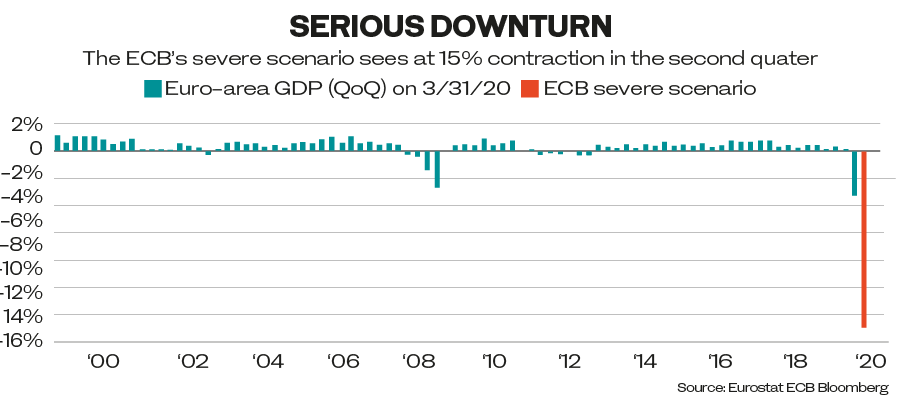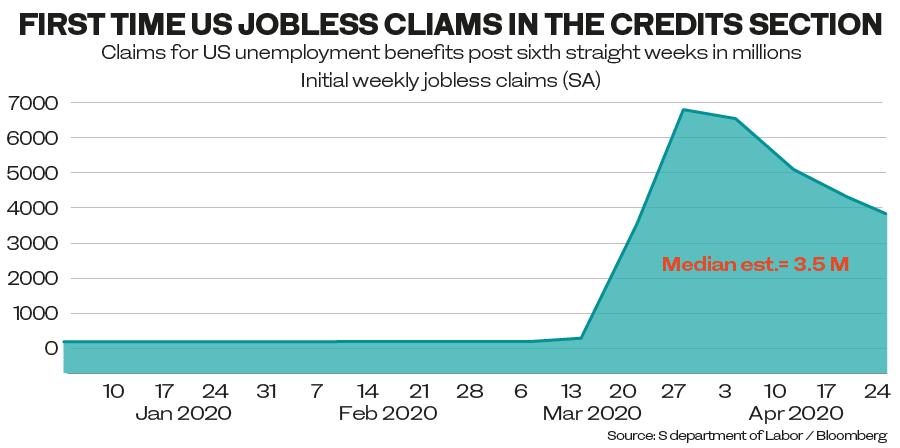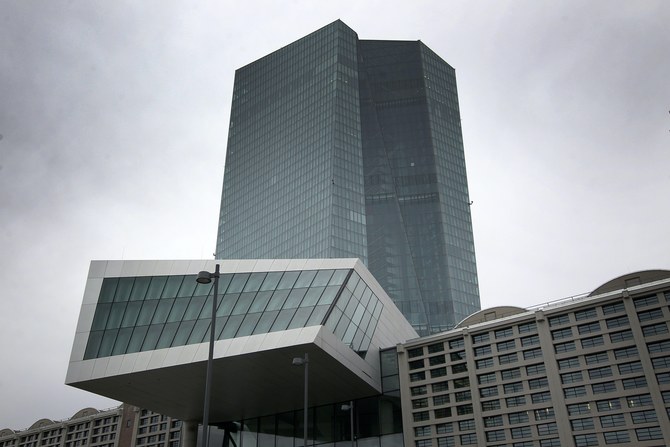What happened:
US first-time jobless claims jumped another 3.8 million, topping 30 million over the last six weeks.
Eurozone growth rates were dismal too, coming in at minus 3.8 percent for the eurozone as a whole, minus 5.8 percent for France, minus 5.2 percent for Spain, and minus 4.7 percent for Italy.
The corporate earnings season continued with Apple, Amazon and Twitter all either taking a hit or showing lackluster results.
Apple’s net income stood at $11.2 billion. Revenue was up by 1 percent, which was below guidance. Twitter reported a loss of $8 million, due to slagging advertising revenue, and Amazon reported a net income of $2.5 billion, down 30 percent compared to the first quarter (Q1) of 2019. Sales increased by 26 percent as orders jumped due to the coronavirus disease (COVID-19) lockdowns. Operating amidst lockdown and social distancing increased the cost base, which explains the discrepancy between revenues and profit.
US multinational energy corporation ConocoPhillips reported a loss of $1.7 billion due to the challenging environment in the oil and gas sector.
RBS was forecasting an operating profit of £519 million and beefed up its loan loss provisions to £802 million.
Budget airline Ryanair announced that it would cut 3,000 jobs, representing 15 percent of its workforce. The company’s CEO Michael O’Leary told Bloomberg that the $30 billion in state aid to some carriers but not others would lead to market distortions, penalizing some of the more profitable budget airlines.
BA (British Airways) is temporarily closing its base at Gatwick airport.

Background:
The European Central Bank (ECB) left rates unchanged despite the eurozone’s dismal GDP numbers. ECB president, Christine Lagarde, predicted the eurozone economy to contract between 5 and 12 percent for the full year of 2020. In its downside scenario for the second quarter it sees a contraction of 15 percent.
The bank did not increase its 750 billion-euro emergency asset purchase program, but Lagarde indicated willingness to do so down the line.
The ECB left interest rates prima facie unchanged. Its TLTRO-III program lets banks obtain three-year liquidity between minus 0.5 and minus 1 percent if they meet lending goals.
Under its PELTRO (pandemic emergency longer-term refinancing operations) they can get loans with maturities up to 16 months at an interest rate of minus 0.25 percent. The ECB has also allowed banks in some cases to lower the requirements on collateral to BB. These measures are tantamount to a stealth interest-rate cut and are designed to ease the stress on European lenders.
Decision making is less clear cut at the ECB than it is at the US Federal Reserve, because the eurozone consists of 19 countries with their own fiscal systems. However, both institutions showed a similar trajectory by announcing huge programs last month and only tweaking them at the margins this month, while indicating willingness to do more if necessary and emphasizing the importance of further fiscal stimulus.
The EU has so far spent 3.5 trillion euros in rescue funding. Going forward the institution will frontload its seven-year budget. It will also borrow money for a recovery program, which European Commission President Ursula von der Leyen likened to the Marshall Plan (a 1948 post-war foreign aid scheme for Western Europe) and which will be funneled through the multiannual budget to be frontloaded again.
While US first-time jobless claims for the week ending April 24 are high, new claims seem to be on a downward trajectory. More than 30 million Americans have filed for unemployment benefits over the last six weeks. US Secretary of Labor Eugene Scalia told CNBC that benefits had not trickled through to recipients at the desired speed, because many states had antiquated computer systems rendering processing the sheer number of transactions challenging.
The unemployment rate will be higher than after the financial crisis, which is bound to leave a big dent on consumer confidence and consumer spending in an economy which depends 70 percent on the consumer.
Under any scenario, employment is not going to increase as fast as people have lost jobs over the last two months.

Where we go from here:
The dismal economic news combined with lackluster earnings reports resulted in markets sliding across the board on Thursday and into Friday. This stands in stark contrast to the April performance of all major stock exchanges. The S&P 500 was up by 18 percent and the Nasdaq by 21 percent.
Again, this is a striking difference with the overall macroeconomic picture, giving rise to the question, if or rather when we shall see a downward adjustment?

— Cornelia Meyer is a Ph.D.-level economist with 30 years of experience in investment banking and industry. She is chairperson and CEO of business consultancy Meyer Resources.
Twitter: @MeyerResources




















